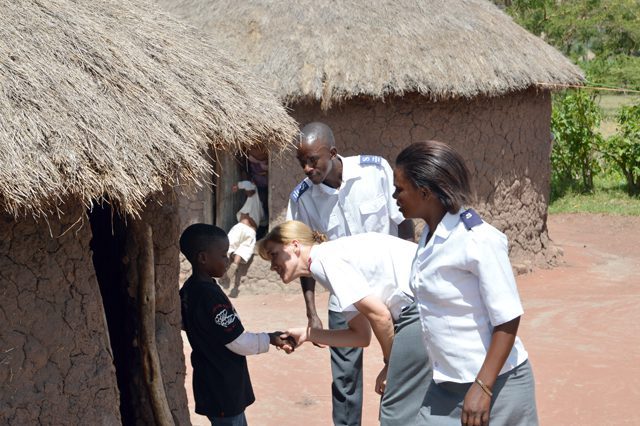
What can the African church offer the body of Christ?
By Ted Horwood, Colonel
Not long ago we were driving on a dusty road through the interior of Tanzania when we came upon a traditional house—mud bricks, mud plaster and dried grass on the roof.
An old woman emerged from the house. She said she had been there all her life. She was alone now and maintaining the property was becoming difficult. We asked to use the traditional latrine located a distance from her house, and she gave us permission. She brought some raw, unshelled peanuts, grown on her land.
I noticed the mango tree that was heavy with blossoms next to her house. It is believed that when the mango tree flowers in that way, it is God’s provision for the people of Tanzania because the harvest would be small. As I looked at the mud huts, traditional farming instruments and the lack of modern amenities, I thought that not much had changed since The Salvation Army was established here. This is a continent of self-determined, hospitable and perseverant people. They value their tradition but seek innovation and hope for a better tomorrow.
In 1883, Catherine Booth fabricated an Army flag and offered it to the officers who would soon set out to pioneer the work in Cape Town. It has been nearly 130 years since the first officers disembarked a rickety sailing ship to start the work of the Army in Africa, and over a century of wars, natural disasters and national disputes have made an impact on its ministry. In spite of all the tumult, today nearly 250,000 senior soldiers live in Africa, accounting for nearly 40 percent of all senior soldiers worldwide.

The Pew Research Center’s “Global Christianity” report indicated major shifts since the days when those first pioneer officers arrived in Africa. At that time, two-thirds of the world’s Christians lived in Europe. Now, nearly as many Christians live in sub-Saharan Africa (24 percent) as in Europe (26 percent). Among African countries, 31 now have Christian majorities. Since 1900, the number of Christians in Africa exploded from 10 million to 500 million in 2012.
If Western media features Africa, it is usually because of calamity, war or most recently, Ebola. But given the opportunity, Africa could offer much more, particularly to the body of Christ.

Africans have a zeal for the gospel, worship and the lost. And unlike their Western counterparts, they are not constrained to 90 minutes. How many visitors to corps around Africa have been stunned by the quality of singing and the enthusiasm of dancing in the worship? There is freedom and sincerity. Many Africans will leave home and any hope of financial security to plant new ministries. Others will move to new locations and start The Salvation Army in their homes. A few months later, headquarters will get a call to say that a new congregation has begun and they have started building a corps hall; please send an officer and a flag.
Africans also have the ability to communicate in a variety of languages. Rarely will you find someone who speaks only one language. This versatility of culture and communication has propelled many new ministries. Pride in the Army, a wiliness to sacrifice in order to evangelize, the ability to accept and adapt with the intention of establishing new work—these are good lessons and valuable traits of an African Salvationist.
The African Church is not homogeneous and there are many expressions of Christianity that bear the hallmarks of prosperity and power, syncretism and ancestral spirituality. Some would call this a lack in theological depth. Others would say that unlike African Islam, Christianity has not had its indigenous character established, and remains constrained by an imported value and belief system. It is true that lack of widespread education—particularly at the university level—is a significant factor among officers and Salvationists. But as the African proverb states, “Until the lions tell their tale, the story of the hunt will always glorify the hunter.”

Unfortunately, what is also missing in the Army’s Africa expression is the ability to self finance the work. With financial reliance comes a loss of control and, frequently, a diminished voice in the global discussion. Coupled with language barriers and education constraints, the Army in Africa can be overlooked as a force of change as we look at the next 150 years of Salvation Army ministry.
When those officers disembarked that rickety ship, they were met by a breathless reporter who asked, “Where are your soldiers, your drums, your flags?” They replied, “We are going to raise our soldiers here.”












